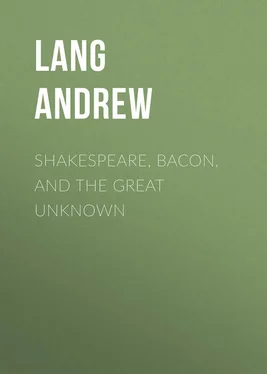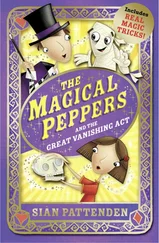Andrew Lang - Shakespeare, Bacon, and the Great Unknown
Здесь есть возможность читать онлайн «Andrew Lang - Shakespeare, Bacon, and the Great Unknown» — ознакомительный отрывок электронной книги совершенно бесплатно, а после прочтения отрывка купить полную версию. В некоторых случаях можно слушать аудио, скачать через торрент в формате fb2 и присутствует краткое содержание. Жанр: foreign_antique, foreign_prose, на английском языке. Описание произведения, (предисловие) а так же отзывы посетителей доступны на портале библиотеки ЛибКат.
- Название:Shakespeare, Bacon, and the Great Unknown
- Автор:
- Жанр:
- Год:неизвестен
- ISBN:нет данных
- Рейтинг книги:4 / 5. Голосов: 1
-
Избранное:Добавить в избранное
- Отзывы:
-
Ваша оценка:
- 80
- 1
- 2
- 3
- 4
- 5
Shakespeare, Bacon, and the Great Unknown: краткое содержание, описание и аннотация
Предлагаем к чтению аннотацию, описание, краткое содержание или предисловие (зависит от того, что написал сам автор книги «Shakespeare, Bacon, and the Great Unknown»). Если вы не нашли необходимую информацию о книге — напишите в комментариях, мы постараемся отыскать её.
Shakespeare, Bacon, and the Great Unknown — читать онлайн ознакомительный отрывок
Ниже представлен текст книги, разбитый по страницам. Система сохранения места последней прочитанной страницы, позволяет с удобством читать онлайн бесплатно книгу «Shakespeare, Bacon, and the Great Unknown», без необходимости каждый раз заново искать на чём Вы остановились. Поставьте закладку, и сможете в любой момент перейти на страницу, на которой закончили чтение.
Интервал:
Закладка:
As to the teacher, a good endowment would be apt to attract a capable man. What was the endowment of Stratford School? It was derived from the bequest of Thomas Jolyffe (died 1482), a bequest of lands in Stratford and Dodwell, and before the Reformation the Brethren of the Guild were “to find a priest fit and able in knowledge to teach grammar freely to all scholars coming to him, taking nothing for their teaching.. ” “The Founder’s liberal endowment made it possible to secure an income for the Master by deed. Under the Reformation, Somerset’s Commission found that the School Master had £10 yearly by patent; the school was well conducted, and was not confiscated.” 41 41 C. I. Elton, William Shakespeare , His Family and Friends , pp. 97, 98.
Baconians can compare the yearly £20 (the salary in 1570–6, which then went much further than it does now) with the incomes of other masters of Grammar Schools, and thereby find out if the Head-Master was very cheap. Mr. Elton (who knew his subject intimately) calls the provision “liberal.” The Head-Master of Westminster had £20 and a house.
As to the method of teaching, it was colloquial; questions were asked and answered in Latin. This method, according to Dr. Rouse of Perse School, brings boys on much more rapidly than does our current fashion, as may readily be imagined; but experts vary in opinion. The method, I conceive, should give a pupil a vocabulary. Lilly’s Latin Grammar was universally used, and was learned by rote, as by George Borrow, in the last century. See Lavengro for details. Conversation books, Sententiæ Pueriles , were in use; with easy books, such as Corderius’s Colloquia , and so on, for boys were taught to speak Latin, the common language of the educated in Europe. Waifs of the Armada, Spaniards wrecked on the Irish coast, met “a savage who knew Latin,” and thus could converse with him. The Eclogues of Mantuanus, a Latin poet of the Renaissance (the “Old Mantuan” of Love’s Labour’s Lost ), were used, with Erasmus’s Colloquia , and, says Mr. Collins, “such books as Ovid’s Metamorphoses” (and other works of his), “the Æneid, selected comedies of Terence and Plautus, and portions of Cæsar, Sallust, Cicero, and Livy.”
“Pro-di-gi-ous!” exclaims Mr. Greenwood, 42 42 The Shakespeare Problem Restated , p. 44.
referring to what Mr. Collins says Will had read at school. But precocious Latinity was not thought “prodigious” in an age when nothing but Latin was taught to boys – not even cricket. Nor is it to be supposed that every boy read in all of these authors, still less read all of their works, but these were the works of which portions were read. It is not prodigious. I myself, according to my class-master, was “a bad and careless little boy” at thirteen, incurably idle, but I well remember reading in Ovid and Cæsar, and Sallust, while the rest of my time was devoted to the total neglect of the mathematics, English “as she was taught,” History, and whatsoever else was expected from me. Shakespeare’s time was not thus frittered away; Latin was all he learned (if he went to school), and, as he was (on my theory) a very clever, imaginative kind of boy, I can conceive that he was intensely interested in the stories told by Ovid, and in Catiline’s Conspiracy (thrilling, if you know your Sallust); and if his interest were once aroused, he would make rapid progress. My own early hatred of Greek was hissing and malignant, but as soon as I opened Homer, all was changed. One was intensely interested!
Mr. Greenwood will not, in the matter of books, go beyond Mr. Halliwell-Phillipps, 43 43 The Shakespeare Problem Restated , p. 39.
“Lilly’s Grammar, and a few classical works chained to the desks of the free schools.” Mr. Collins himself gives but “a few classical books,” of which portions were read. The chains were in all the free schools, if Mr. Halliwell-Phillipps is right. The chains, if authentic, do not count as objections.
Here it must be noted that Mr. Greenwood’s opinion of Will’s knowledge and attainments is not easily to be ascertained with precision. He sees, of course, that the pretension of the extreme Baconians – Will could not even write his name – is absurd. If he could not write, he could not pass as the author. Mr. Greenwood “fears that the arguments” (of a most extreme Baconian) “would drive many wandering sheep back to the Stratfordian fold.” 44 44 Vindicators of Shakespeare , p. 210.
He has therefore to find a via media , to present, as the pseudo-author, a Will who possessed neither books nor manuscripts when he made his Testament; a rustic, bookless Will, speaking a patois, who could none the less pass himself off as the author. So “I think it highly probable,” says Mr. Greenwood, “that he attended the Grammar School at Stratford for four or five years, and that, later in life, after some years in London, he was probably able to ‘bumbast out a line,’ and perhaps to pose as ‘Poet-Ape who would be thought our chief.’” 45 45 Vindicators of Shakespeare , p. 187.
Again, “He had had but little schooling; he had ‘small Latin and less Greek’; but he was a good Johannes Factotum , he could arrange a scene, and, when necessary, ‘bumbast out a blank verse.’” 46 46 Shakespeare Problem Restated , p. 223.
But this is almost to abandon Mr. Greenwood’s case. Will appears to me to be now perilously near acceptance as Greene’s “Shake-scene,” who was a formidable rival to Greene’s three professional playwrights: and quite as near to Ben’s Poet-Ape “that would be thought our chief,” who began by re-making old plays; then won “some little wealth and credit on the scene,” who had his “works” printed (for Ben expects them to reach posterity), and whom Ben accused of plagiarism from himself and his contemporaries. But this Shake-scene, this Poet-Ape, is merely our Will Shakespeare as described by bitterly jealous and envious rivals. Where are now the “works” of “Poet-Ape” if they are not the works of Shakespeare which Ben so nobly applauded later, if they are not in the blank verse of Greene’s Shake-scene? “Shakespeare’s plays” we call them.
When was it “necessary” for the “Stratford rustic” to “bumbast out a blank verse”? Where are the blank verses which he bumbasted out? For what purposes were they bumbasted? By 1592 “Shake-scene” was ambitious, and thought his blank verse as good as the best that Greene’s friends, including Marlowe, could write. He had plenty of time to practise before the date when, as Ben wrote, “he would be thought our chief.” He would not cease to do that in which he conceived himself to excel; to write for the stage.
When once Mr. Greenwood deems it “highly probable” that Will had four or five years of education at a Latin school, Will has as much of “grounding” in Latin, I think, as would account for all the knowledge of the Roman tongue which he displays. His amount of teaching at school would carry and tempt even a boy who was merely clever, and loved to read romantic tales and comic plays, into Ovid and Plautus – English books being to him not very accessible.
Here I may speak from my own memories, for though utterly idle where set school tasks were concerned, I tried very early to worry the sense out of Aristophanes – because he was said to contain good reading.
To this amount of taste and curiosity, nowise unexampled in an ordinary clever boy, add Genius , and I feel no difficulty as to Will’s “learning,” such as, at best, it was. “The Stratfordian,” says Mr. Greenwood, “will ingeminate ‘Genius! Genius!’” 47 47 The Shakespeare Problem Restated , p. 69.
I do say “Genius,” and stand by it. The ordinary clever boy, in the supposed circumstances, could read and admire his Ovid (though Shakespeare used cribs also), the man of genius could write Venus and Adonis .
Интервал:
Закладка:
Похожие книги на «Shakespeare, Bacon, and the Great Unknown»
Представляем Вашему вниманию похожие книги на «Shakespeare, Bacon, and the Great Unknown» списком для выбора. Мы отобрали схожую по названию и смыслу литературу в надежде предоставить читателям больше вариантов отыскать новые, интересные, ещё непрочитанные произведения.
Обсуждение, отзывы о книге «Shakespeare, Bacon, and the Great Unknown» и просто собственные мнения читателей. Оставьте ваши комментарии, напишите, что Вы думаете о произведении, его смысле или главных героях. Укажите что конкретно понравилось, а что нет, и почему Вы так считаете.












